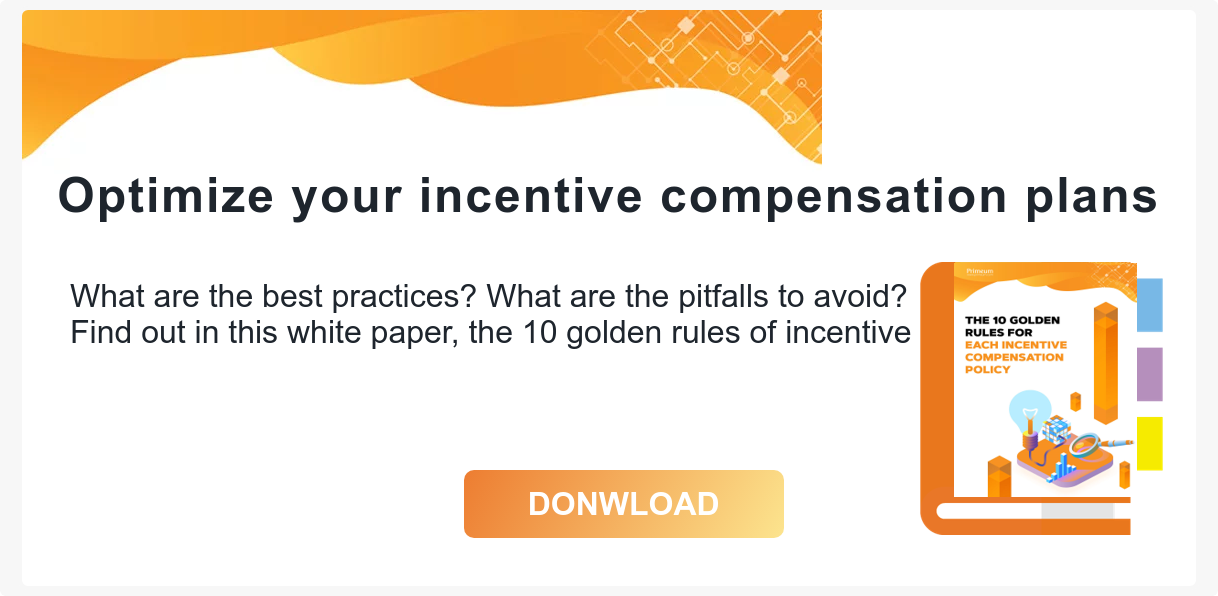A company’s economic health is inherently linked to the motivation levels of its staff, particularly its sales force. However, fixed salaries do not allow the company to specifically reward team members making the greatest effort. In order to motivate but also reward levels of effort being made, more and more companies are choosing bonus schemes in addition to their fixed salary plans.
This incentivising form of compensation, awarded to an employee by the company, has two main goals: add value to increase team motivation, and boost the company’s performance. The challenges and objectives of incentive are as important for the company as they are for its staff.
What is incentive compensation ?
Incentive compensation is a reward system, and is very popular with modern companies. Over the course of the last decade, it’s been observed that bonus scheme is no longer reserved for sales staff, but other departments as well. Rewarding both performance and results, it represents a serious motivation lever.
Bonus schemes must be carefully planned out; if the plan implemented by the company is not properly established, it can have the unintended effect of preventing team from reaching the goals and results they’ve been set. It is essential that the company’s overall strategy be factored in to any incentive plan. By way of example, in order to determine the percentage of total pay that will be allocated to incentive, we must take into account the sales agent’s level of responsibility but also the size of the company and its business culture, which are essential and concrete data points. Incentive compensation usually accounts for between 10 and 30% of an employee’s total salary. Beyond this bracket, it becomes difficult to vary the compensation level because the employee no longer sees it as a bonus, but as “another salary”.
To create an equitable system of incentive compensation, the next step is to decide how to reward your staff. Often used with thresholds mechanisms within a company (as this makes calculation easier), this method is most effective when constructed in a continuous manner, following a logarithmic curve. Consult our practical guidelines and find out why it’s better to have an objective and a continuously-distributed bonus scheme.
Today, priority is given to incentive that fluctuates from one year to another, as opposed to what was common practice just a few years ago. This type of compensation must be capable of evolving in order to stay close to evolving objectives, strategies and markets.
Challenges in incentive compensation
Incentive compensation (and especially target bonuses) are becoming more and more widely-used, and are no longer reserved for sales staff, traders and other banking employees. In 2014, variable pay awarded rose by 2% on the previous year. To one extent or another, variable income now applies to 9 high-potential employees in every 10, and is also received by 60% of first-level executives. For the latter, variable income represents 10% of their annual fixed salary. Non-management level employees are also affected by this trend. The objective of variable pay is to incentivise each beneficiary to contribute to boosting the company’s image.
In this way, incentive scheme has become a value creation tool. Current priorities for companies include success, image improvement, continuous improvement of results and customer satisfaction. Companies are also placing greater importance on the delegation of the decision-making process in order to encourage staff at all levels to take more initiative. In terms of incentive issues for managers, these include strategy, initiative, continuous development of objectives, and the implementation of corrective measures.
Objectives for motivation and internal engagement
In order to ensure that a company can achieve the performance targets set, it will need to implement a motivational and effective bonus scheme. This scheme must be well balanced so as to reward an employee’s performance, and the results obtained, in a fair and proportional way. The bonus scheme can help develop team spirit, give responsibility to various individuals, provide intellectual stimulus and avoid the sensation of routine, and to allow each employee to work independently.
In order to succeed, the company should implement bonus schemes on both an individual and collective basis, which will create balance between motivation, control and coherence while also taking into account new strategic priorities. Companies are also using innovative tools in order to establish equitable systems for incentive compensation. These allow users to generate financial simulations in order to improve their strategic planning based on the realities of the company’s situation and the market, while also taking into account possibilities for future development.





